One thing everybody enjoyed as a child was a good water fight, especially when the summer came around.
Unfortunately, once you had accidentally splashed an adult or made another kid cry, the fun would be brought to a quick halt and you'd be ordered inside to get dry.
These days it seems kids are too busy tampering with their mobile phones and sitting indoors playing on screens to get out and enjoy this type of fun.
But for the rest of us, every year in Thailand, we're given a three-day license to relive those childhood memories and throw water at almost any person, at any time of the day!
It's called Songkran (สงกรานต์), and yes, there is a little more to it that just a big water fight. In this article, I give you the heritage and cultural meanings behind the festivities, and some useful tips for staying safe and having fun, just like these two lovely ladies below.
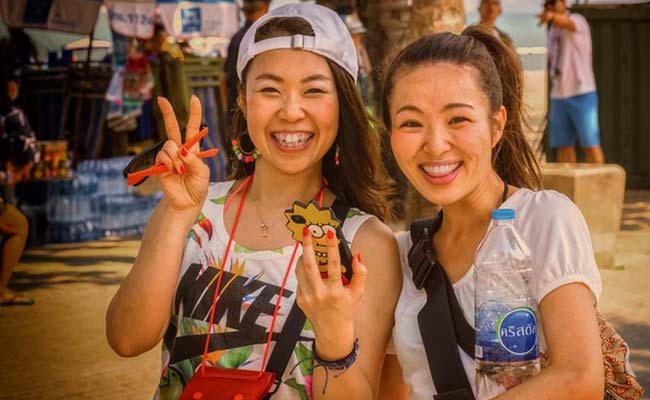
What Is Thailand's Songkran Festival?
Songkran is a traditional Thai festival that marks the Thai New Year. The festival is an important part of Thai culture and has become a major tourist attraction, drawing visitors from all over the world to experience the fun and festivities.
In Sanskrit, “Songkran” translates to “to pass” or “move into,” symbolizing the transition of the sun, moon and planets into a new zodiac orbit.
The festival takes place from April 13 to 15, although depending on the region's customs and traditions the festivities can take place for 5 or 10 days. Traditionally, the dates for the festival were set by Brahmin priests, but these days the dates are fixed.
Originally, the Songkran festival served as a means to bestow blessings upon others. Within Thai culture, the pouring of water on a person symbolizes the purification of misfortune and the ushering in of a new beginning.
The festival is an important time for making merit, where Thais give alms to monks and make offerings at temples. People can be seen pouring water on Buddha images as a symbol of purification and cleansing.
Being an agriculturally-driven economy, Songkran is also a time to welcome the rain after the hot/dry season. April sees the start of the rainy season; a very important time for farmers.
Songkran is a time for people to return home to their parents and pay respects to their elders by way of small gifts. In return, blessings are given by elders to younger folk.
It is a time for people to reflect on all that their parents and elders have done for them in the past, and most importantly for Thais, an opportunity to have a darn good party.
In the modern day, people engage in water fights, throwing water at each other using buckets, water guns, and other water containers. The water is symbolic of washing away the bad luck of the previous year and bring good luck for the new year.
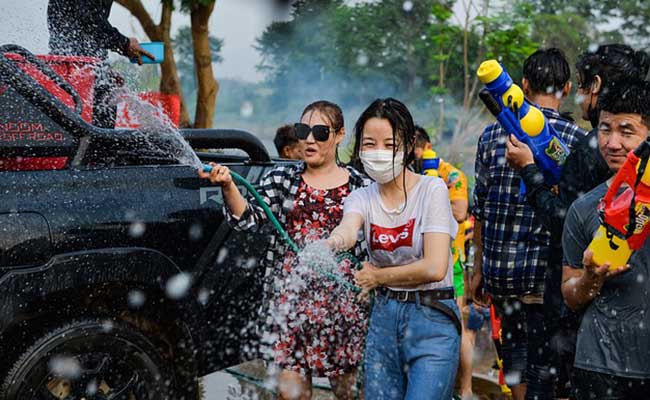
In addition to the water fights, Songkran also features traditional cultural activities such as parades and cultural shows, including the popular Miss Songkran contest (เทพีสงกรานต์). People dress up in traditional Thai clothing, perform traditional dances, and enjoy traditional Thai food.
In a nutshell, Songkran is the Thai New Year: a time for reflection, celebration, and community. It is a time to let go of the old and welcome the new, to celebrate the past year's achievements and to look forward to a bright future.
And while modern-day Songkran may be frowned upon by traditionalists for straying from its origins and traditions, it remains a festival that unites the country with an incredible sense of togetherness and pride.
Traditional Songkran Activities
1. Rot Nam Dum Hua (รดน้ำดำหัว)
Rot Nam Dum Hua, also known as the “blessing ceremony,” takes place on the first day of Songkran. It is a tradition where younger individuals pay respects to Buddhist monks or senior members of the community by pouring scented water over their hands or feet. This act is considered a form of merit-making and is believed to accumulate positive karma.
The water used in Rot Nam Dum Hua is often infused with fragrant flower petals or herbal extracts, adding to the spiritual significance of the ritual. Additionally, some people may also sprinkle water on Buddha statues as a symbolic gesture of reverence and devotion.
2. National Family Day (วันครอบครัวแห่งชาติ)
On the second day of Songkran, families come together to honor National Family Day. It's a time for quality bonding as children lovingly prepare scented water infused with rose and jasmine to wash their parents' feet.
Alongside flower garlands, blessings flow from parents to children, symbolizing the enduring bonds of kinship and love. Families may also exchange gifts, and will certainly share lots of traditional food.
3. Song Nam Phra (สรงน้ำพระ)
“Song Nam Phra” is a sacred ritual where devout Buddhists delicately pour scented water over Buddha images (Phra Phutharup พระพุทธรูป ) either at home or in temples. This symbolic act is believed to usher in good fortune and prosperity for the New Year.
Additionally, Songkran serves as a day for spring cleaning, with many Thais seizing the opportunity to meticulously tidy their homes in preparation for the incoming year.
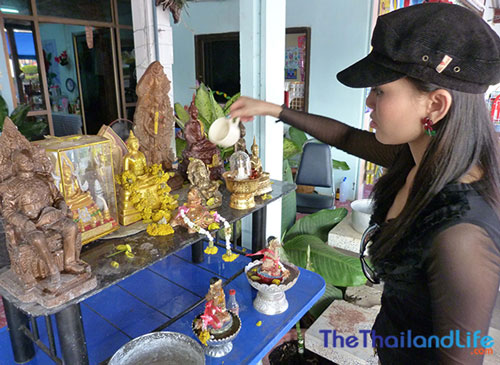
4. Making Sand Pagodas (ก่อเจดีย์ทราย /gàw jay-dii saai)
While the festival's signature water-throwing revelry garners widespread attention, a quieter yet equally profound practice unfolds within temple grounds: the art of crafting sand pagodas.
These mounds of sand, meticulously shaped into chedis or pagodas, offer a glimpse into the spiritual reverence of the occasion. Some temples host competitions, yielding elaborate creations adorned with vibrant decorations that showcase the artisans' skill and creativity.
For Thai Buddhists, the act of bringing sand to their local temple symbolizes the replenishment of soil or sand inadvertently displaced by temple visitors throughout the year. Adorned with flags or colorful pennants depicting the animals of the Thai zodiac, these sand pagodas stand as symbols of renewal and reverence.
Unlike the structured revelry of other parts of the festival, there's no prescribed date for crafting sand pagodas. This sacred practice unfolds on temple grounds or riverbanks in the days surrounding Songkran, with sand often sourced from the river's edge. In certain locales, the celebration extends beyond temple grounds, with parades and sand-building competitions.
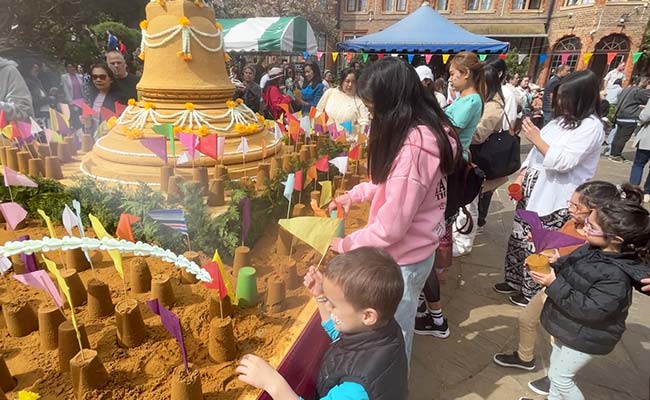
The World's Biggest Water Fight!
Like Christmas and Easter in the UK, the true meaning and traditions behind Songkran have somewhat faded over the years, though one aspect that has gained popularity is the indiscriminate throwing of water.
Water throwing has its roots in the pouring of purified water on hands as a sign of respect, a practice observed by many Thais alongside patting talc onto cheeks.
However, due to the increasingly hot summers in Thailand and the exuberance of youth, this subtle pouring of water has evolved into mass water fights that help cool the nation during the holiday period.
I remember many Songkrans ago when I was a newcomer to Songkran in Bangkok. Seven of us stood at the roadside of my apartment, armed with Super Soakers, a garden hose, and industrial bins full of water. We drenched every moped that drove by.
Unfortunately, we got carried away and soaked a young lady who looked like she'd just stepped out of a salon; her hair immaculately brushed and her makeup flawless—or at least it was until I poured a bucket of water over her head.
Once the deed was done, I was informed by my fellow Thai water thrower that she had clearly stated, “Okay, wet me, but please not my hair”!
Man, I felt pretty bad after that, as she was so gracious. At that point, I vowed to better gauge who really did and didn't want to be involved.
So, a word of advice: If someone doesn't want to be wet, let them be. Consider that some people may be in ill health or on their way to work. Also, note that those of old age and very young children should always be allowed to pass without getting soaked.
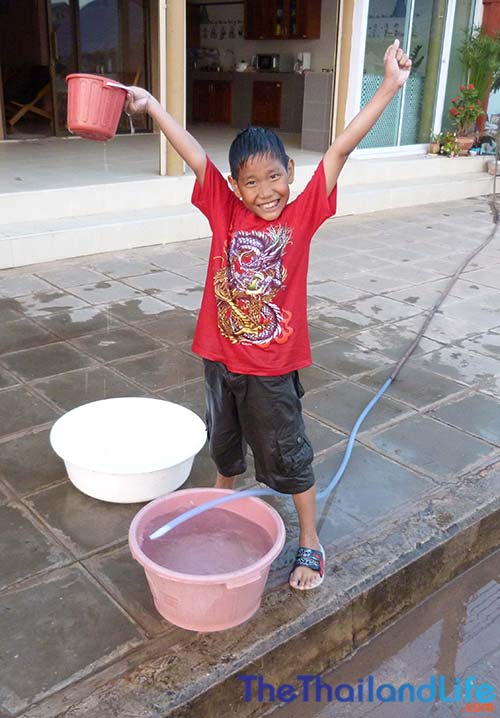
The Tragic Side of Songkran
Unfortunately, the festivities of Songkran are marred every year by the large volume of road traffic accidents.
In 2023, during the Songkran holiday, there were 2,203 road accidents, causing 264 deaths and 2,208 injuries.
The majority of accidents are caused by people driving under the influence of alcohol, highlighting the tragic consequence of such extended enjoyment.
In addition, hundreds of thousands of Thais rush to leave the big cities and get home to see family over the holiday period, and then rush back again to work once it's over. Inevitably, this increase in freeway traffic, and subsequent local traffic in the provinces, means an increase in road accidents.
My 10-Tip Songkran Survival Guide
For many, Songkran is the most fun time to be living or holidaying in Thailand: It’s baking hot, the beer is flowing, the music pumping and laughs and smiles are in abundance, even more so than usual.
For others, the novelty of being doused in water quickly wears off after one water fight, and the endless Thai music pumping out of huge speakers until 4am soon takes its toll.
If you are “up for it”, there are a number of safety and water-war survival tips you should take into account before you hit the road in your flip flops.
Follow the top 10-tips below for a safe, happy Songkran holiday in Thailand!
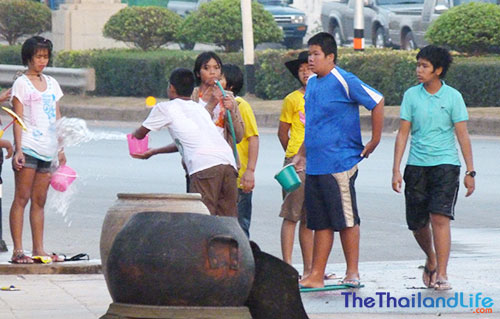
Tip 1: Ziplock It
Make sure you put your phone and wallet in a ziplock bag whenever you leave your home during the Songkran period.
You never know when a couple of kids will roll up and give you a soaking, leaving your mobile dead and banknotes dripping.
Tip 2: Protect Your Eyes
Wear sunglasses when walking the streets during Songkran, and also when engaging in water fights.
As you can imagine, not all water used to fight is clean, and an easier way to get ill is from exposure to bacteria through the eyes.
Tip 3: Close Your Mouth / Don't Drink It!
Similar to tip 3, keep your mouth closed when engaging in water combat. The last thing you want is dysentery from a gulp of dirty water extracted from a dirty pipe. Furthermore, don't drink water from hosepipes or buckets.
Tip 4: Don't Throw Water at Moving Vehicles
Don’t throw water at moving cars or motorbikes. Doing so may cause an accident, and possibly death. It's particularly dangerous to throw water at someone on a motorbike, as they can easily lose balance, or momentarily lose vision.
Tip 5: Leave Your Car/Motorbike Keys at Home
On the subject of vehicles, don’t drink and drive, period. Yes, you can get away with it in Thailand, but it endangers people’s lives.
The Songkran period sees the highest volume of road accidents and road deaths each year. Lead by example.
Tip 6: No Throwing Ice!
Don’t throw water containing lumps of ice. It might sound like a laugh to make the water that much colder, but this stupidity causes numerous cuts and bruises every year.
Tip 7: Respect Songkran Cultural Boundaries
Don’t throw water at monks, the elderly, or babies. This is disrespectful, and where young children are concerned, potentially dangerous.
Monks and the elderly are culturally exempt from the compulsory Songkran soaking.
Tip 8: Ladies, Wear Dark Colors
If you’re female, it’s best to wear clothing that won't turn see-through if soaked with water. A few buckets of water over your head and before you know it you’ll be an unwitting participant in a wet t-shirt competition.
Tip 10: Keep Your Bits Well Hidden
Ladies, no matter how drunk, wet and liberated you feel, it is not okay to strip down to your bra or get your boobs out in the street.
And men, keep your pecker in your pants, this isn’t a varsity party!
You are likely to get arrested, and end up on going viral on Instagram!
Tip 10: Tool Up!
On a lighter note, preempt attacks by carrying a water pistol in your inside pocket and a super soaker strapped to your back, Rambo style!
Never roll out half loaded. Keep a full barrel at all times.
That's it!
Suk San Wan Songkran Tuuk Khon / สุขสันต์วันสงกรานต์ทุกคน (Happy Songkran everybody).